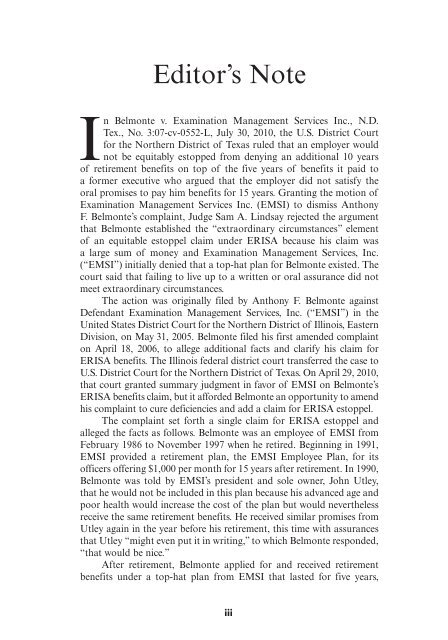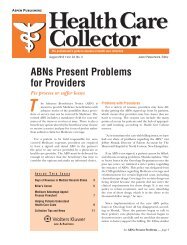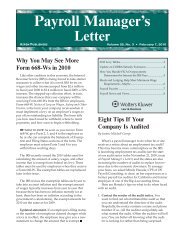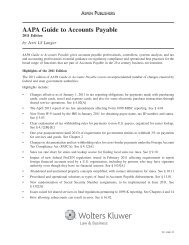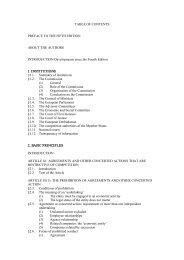journal of pension planning & compliance - Kluwer Law International
journal of pension planning & compliance - Kluwer Law International
journal of pension planning & compliance - Kluwer Law International
You also want an ePaper? Increase the reach of your titles
YUMPU automatically turns print PDFs into web optimized ePapers that Google loves.
Editor’s Note<br />
I<br />
n Belmonte v. Examination Management Services Inc., N.D.<br />
Tex., No. 3:07-cv-0552-L, July 30, 2010, the U.S. District Court<br />
for the Northern District <strong>of</strong> Texas ruled that an employer would<br />
not be equitably estopped from denying an additional 10 years<br />
<strong>of</strong> retirement benefits on top <strong>of</strong> the five years <strong>of</strong> benefits it paid to<br />
a former executive who argued that the employer did not satisfy the<br />
oral promises to pay him benefits for 15 years. Granting the motion <strong>of</strong><br />
Examination Management Services Inc. (EMSI) to dismiss Anthony<br />
F. Belmonte’s complaint, Judge Sam A. Lindsay rejected the argument<br />
that Belmonte established the “extraordinary circumstances” element<br />
<strong>of</strong> an equitable estoppel claim under ERISA because his claim was<br />
a large sum <strong>of</strong> money and Examination Management Services, Inc.<br />
(“EMSI”) initially denied that a top-hat plan for Belmonte existed. The<br />
court said that failing to live up to a written or oral assurance did not<br />
meet extraordinary circumstances.<br />
The action was originally filed by Anthony F. Belmonte against<br />
Defendant Examination Management Services, Inc. (“EMSI”) in the<br />
United States District Court for the Northern District <strong>of</strong> Illinois, Eastern<br />
Division, on May 31, 2005. Belmonte filed his first amended complaint<br />
on April 18, 2006, to allege additional facts and clarify his claim for<br />
ERISA benefits. The Illinois federal district court transferred the case to<br />
U.S. District Court for the Northern District <strong>of</strong> Texas. On April 29, 2010,<br />
that court granted summary judgment in favor <strong>of</strong> EMSI on Belmonte’s<br />
ERISA benefits claim, but it afforded Belmonte an opportunity to amend<br />
his complaint to cure deficiencies and add a claim for ERISA estoppel.<br />
The complaint set forth a single claim for ERISA estoppel and<br />
alleged the facts as follows. Belmonte was an employee <strong>of</strong> EMSI from<br />
February 1986 to November 1997 when he retired. Beginning in 1991,<br />
EMSI provided a retirement plan, the EMSI Employee Plan, for its<br />
<strong>of</strong>ficers <strong>of</strong>fering $1,000 per month for 15 years after retirement. In 1990,<br />
Belmonte was told by EMSI’s president and sole owner, John Utley,<br />
that he would not be included in this plan because his advanced age and<br />
poor health would increase the cost <strong>of</strong> the plan but would nevertheless<br />
receive the same retirement benefits. He received similar promises from<br />
Utley again in the year before his retirement, this time with assurances<br />
that Utley “might even put it in writing,” to which Belmonte responded,<br />
“that would be nice.”<br />
After retirement, Belmonte applied for and received retirement<br />
benefits under a top-hat plan from EMSI that lasted for five years,<br />
iii


